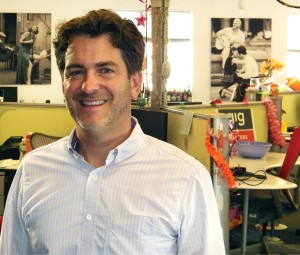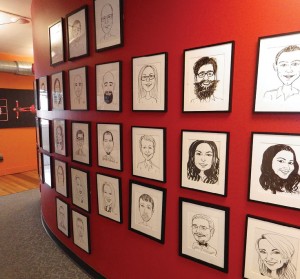In 1988, Michael Caldwell, co-founder and CEO of entertainment-themed Gigmasters in Norwalk, attended Indiana University on a viola scholarship. Too much practice ”” “all alone, no windows, two to three hours a day” ”” doomed his viola career and he took up economics. He remained active on viola, though, through a single bulletin board”™s postings for musicians, “the gig board” as IU students called it.
Caldwell worked several years in finance in Boston and New York City until, in 1997, he resurrected the essence of the IU gig board as Gigmasters, which now employs 38 and fields about 1,000 inquiries per day at its website, Gigmasters.com.
Caldwell said by not playing music, but promoting it, he and Gigmasters have helped “tens of thousands” earn paychecks for their passion.
The company is essentially a web-based gig board to connect talent across the music and entertainment spectrums in the lower 48 states, though 5 percent of its bookings are in Canada. When it comes to putting artists next to other artists, Caldwell said algorithms do some of the heavy lifting, “but we rely a lot on the human side.”
Elvis, or in this case, his tributors and impersonators, remains very popular for events, corporate and otherwise.
“He has a particularly passionate fan base,” Caldwell said of The King.
Gigmasters offers hundreds of categories including entertainers ”” bands from rock to chamber to classical ”” and event vendors like photographers and florists. The company has provided more eclectic entertainers like fire-eaters and belly dancers to events as well. Impersonators are popular, but their popularity depends on who they impersonate. Caldwell said he has seen celebrity impersonators drop the mannerisms of one falling star and hitch their stars to a new marquee name the following day. He said pyrotechnics are popular, if the venue can accommodate the flames.
The search, he said, perhaps not surprisingly, was heating up for a Donald Trump impersonator.
In the corporate world, themed events have risen in popularity. Caldwell said celebrations like Cinco de Mayo and St. Patrick”™s Day work well because they offer complementary elements that carry an entire event: music, food and beverage, but arranging for caterers remains a back-burner offering for Gigmasters.
“Caterers are often tightly coupled with the venue; the caterer may be the venue itself. It”™s a whole different animal and only a small part of our business,” Caldwell said.
Speed rules the industry.
“Five years ago, we did 5 percent of our business on tablets and smartphones; now we do 50 percent,” Caldwell said. “A booking that used to take a week now takes an hour. The customer”™s expectation of speed is incredible right now. In the old days, reminders went out in two to three days; now it”™s two to three hours. It”™s directly attributable to the rise of smartphones and tablets.”
The company receives 20,000 requests for information per month and about 15 percent of those result in bookings through Gigmasters, which takes 5 percent of the booking fee. Caldwell acknowledged the system presents an end-run opportunity in which band and client operate in the shadows and cut out Gigmasters. But, he said, most bands want to be part of the Gigmasters stable, paying $250 per year to appear on Gigmasters.com.
“They know it”™s a good relationship,” he said.
Booking through Gigmasters also affords customers a buyer protection plan. Stories of gatherings botched by no-shows are legion in the hospitality industry, Caldwell said.
“It could be something as simple as a DJ cancelling. Our buyer protection plan on the consumer side protects any payments. Most planners hire a band, pay half up front and hope the band shows up. Sometimes they do not,” he said. “If you sign up with, for example, a mariachi band with Gigmasters and that band, for whatever reason, cannot make it, we step in and get you a mariachi band replacement. For party planners, it is peace of mind.”
Caldwell said across the years “tens of thousands” of performers of all stripes have used the service.
“I loved music, but I wondered if I was committed enough to make a career of it,” Caldwell said, seated in his company”™s sunny, 4,000-square-foot, 33 S. Main St. office. There is a 1,000-square-foot satellite office across the street where specific projects get hashed out with white boards and pizza among few frills.
Caldwell said his father had long taught music, both to him and to all of his alma mater, Ward-Melville High School on Long Island.
“Dad said not to do music for the money; you”™ve got to love it. He and my mom often could not afford to buy butter. So I didn”™t know if music as a career sounded too good,” he said. “I didn”™t quite have the passion, but I had the utmost respect for those who did. And I had been involved with music all my life, so I didn”™t want to see that go by the wayside.”
Caldwell”™s fellow co-founder is a fellow Ward-Melville alumnus, Kevin Kinyon.
Most of the thousands of entertainers listed have other jobs. “And for a lot of them it is something completely different, the lawyer by day who”™s a standup comedian by night,” Caldwell said. “I think people have this desire to break out of the daily routine and our platform gives them this ability. They don”™t need an agent. All they need is a decent video and decent description of what they do. Getting in the door is fairly easy, but you have to do a good job. The cream floats to the top.”




















